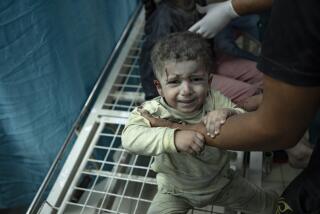Embittered Bosnians Seek Justice for Wartime Abuses
- Share via
KLJUC, Bosnia-Herzegovina — Zineta Fazlic coolly recalled how 15 Serb neighbors raped and beat her to unconsciousness while her 6-year-old son watched. That, she added, paled next to her husband’s eight months in a torture camp.
Her son, now 12, has had epilepsy and recurrent nightmares ever since.
Mehmedalija Fazlic listened as his wife relived horror few Bosnian Muslim women dare admit even to themselves. The rapists, he said, are still free five years after the war, thriving a few miles away in Bosnia’s Serb zone.
“I live for the day I can hurt those people more than they hurt me,” he said. “I blame them all. I don’t care if I go to jail for 100 years for what I do to them. Just let them come.”
For all the talk of reconciliation in faraway capitals and international administrators’ offices in Sarajevo, there are countless people like the Fazlics who lived though hell and do not intend to forget it.
In the five years since warring parties negotiated peace in Dayton, Ohio, Bosnians have taken differing attitudes toward the past. Many say that if ethnic blending is essential, they will try it again.
But almost all share one point of view with the Fazlics: They want the guilty to pay.
The U.N. war crimes tribunal in the Hague, Netherlands, has picked up its pace, with 34 suspects in custody, including a general now on trial for ordering the Srebrenica massacres. But for many, the enemy is still close to home.
“What happened to all those people who killed 200,000 Bosnians?” demanded Hadzija Bajric, a war widow who heads a family association known as the Pearls of Kljuc. “Why are they still walking around free, taunting us?”
Her own husband was taken away in 1992, and she has had no news since. One of the men who took him, Bajric knows, is now a ranking policeman in Serb-controlled territory near Kljuc.
A lasting bitterness is enforced with each grinding day in small towns like Kljuc, where families struggle to find a place to live, where men find no work and where women try desperately to feed and educate disoriented children.
“Just yesterday, a mother with three kids took her own life,” said Sefika Nukic, head of a different Kljuc family association. “Her husband was murdered in the war. She was ruined psychologically. Such women are completely helpless.”
Bajric nodded grimly. “A woman’s main priority is a roof over her head,” she said. “Many live in fear that original owners will evict them. They have no income and exist only on paltry bits of charity from others.”
The Fazlics, for instance, live in a house owned by a Serb, and he is demanding it back. He allowed the family to stay until spring, but Zineta Fazlic said she could not bear to shake his hand.
Recounting their experiences to war crimes prosecutors and to therapists has helped the Fazlics restore a semblance of normal life. They figure prominently in a study of Bosnian resilience by Syracuse University scholar Beverly Allen.
But each day, Bajric and Nukic work with women who still refuse to acknowledge atrocities they suffered.
“We have no idea how many woman were raped, who survived camps designed to humiliate them,” Nukic said. “We only know that the number is very high. And now they are lost because they cannot find their missing, and they see no justice.”
More to Read
Sign up for Essential California
The most important California stories and recommendations in your inbox every morning.
You may occasionally receive promotional content from the Los Angeles Times.













